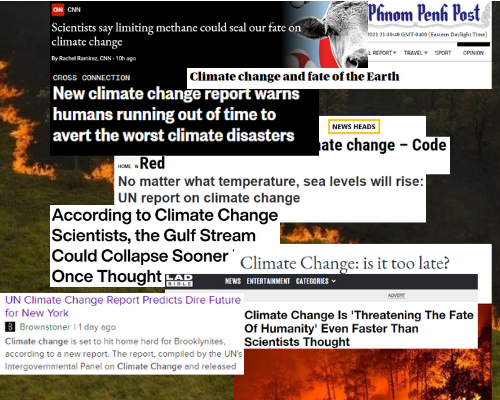

There might be a collective blind spot in the climate discourse distinct from denialism and the ubiquitous shirking of responsibility.
People like certainty. They dislike uncertainty. "Is the climate changing?" "Are we totally fucked?" "Are we going to be okay or is our fate sealed?" These are more soothing questions than "How fucked are we?", "What do we need to do to mitigate the damage and adapt to the future?", or "Where are we going to put climate refugees?"
For climate-watchers, a future of mass starvation, displacement, and violence is by no means preferable, but it is easier to comprehend and less exhausting to prepare for than a future of steadily diminishing living standards and steadily increasing chaos. Though the latter may be more likely. The latest models reduce uncertainty compared to previous iterations and indicate that we will avoid the worst-case scenarios of climate change. A future in which we switch quickly to renewable energy sources and make lifestyle changes is equally comprehensible, but is, at this point, really only a future that could have been. While scientific inquiry has ruled out extreme outcomes, we are left, still, with the middle (1.9°C to 4.4°C, according to the Breakthrough Institute). It is reasonable to say that the world's geopolitical systems could largely adapt to the changes that middle entails with minimal to moderate unrest, or it could fail to do so catastrophically.
It is akin to the debate on free will. Though scientific evidence and philosophical argument for it are thin, most of us really want an internal locus of agency. And we act and legislate as though such a thing exists. More than that, though, we want certainty on the matter. While the literature will not offer conclusive, positive affirmation of free will, neither will it succeed in permanently crushing the kernel of it. (What do we mean when we say "free will"? Body motion? Responsibility? Volition?) A debate exists.
That can be maddening. Because the discourse offers no clear course of action. Should we punish people for their actions, or not? Having heard the plaintiffs and defendants of free will, we might feel only less certain and more queasy about concrete action.
There is a kind of collective free will in question with regard to climate change. Are we the masters of our own destinies here? Or are Earth's ecosystems tipping over in ways that will run out of control? If we all agree what needs to be done, will the wealthy and powerful block that course of action? Is it too late? Will my neighbor turn on me when times get tough, or should I turn on them first? Can the systems we built handle what is coming? Most bluntly: Do we have the ability to take another course?
Because if not, and if I knew that we could not, I will stop recycling and start building my bunker. I can stop contributing to my 401(k) and take comfort in sibal biyongs. The nature of reality dictates our ethics. There is no rulebook, but we need to know the rules to play our best game. So i contend that the alarmism can soothe climate anxiety by delineating a future with fatalistic certainty. As it stands, i have no clear action item. I do not know what game i am playing. I do not know who is in control.
—Lucas